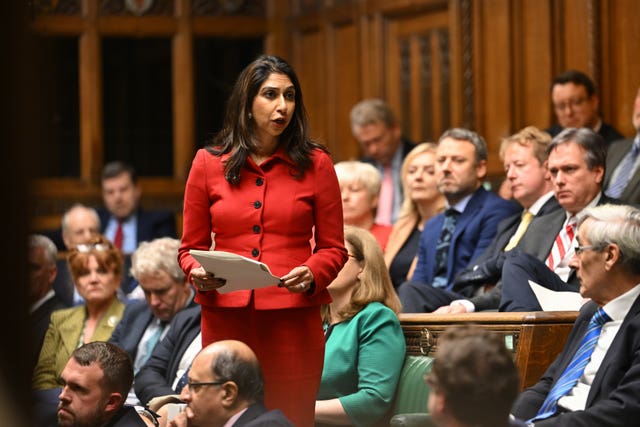
Rishi Sunak was under fresh pressure over his Rwanda policy after his immigration minister resigned with a warning that new legislation to revive the strategy to stop small boats falls short.
Robert Jenrick told the Prime Minister on Wednesday that his draft Bill aimed at stopping small boat crossings “does not go far enough” and is a “triumph of hope over experience”.
Mr Sunak’s long-term political ally argued that he had to quit because he has “such strong disagreements” with his approach to immigration.
The draft Bill compels judges to treat Rwanda as a safe country after the Supreme Court ruled the scheme was unlawful over risks to refugees.
The legislation, which must be voted on by Parliament, gives ministers the powers to disregard sections of the Human Rights Act.
But it does not go as far as providing allowing them to dismiss the European Convention on Human Rights, as hardliners including sacked home secretary Suella Braverman have demanded.
Mrs Braverman’s allies made clear that the legislation is “fatally flawed”, indicating that she believes it will quickly lead the Tories into “electoral oblivion”.
Mr Sunak reportedly told Conservative backbenchers at the 1922 Committee shortly before Mr Jenrick quit that they must “unite or die”.
In his resignation letter, Mr Jenrick said he was “grateful” for Mr Sunak moving towards his position on the legislation, but added he does not “believe it provides us with the best possible chance of success”.
Mr Jenrick said they must do “whatever it takes” to stop Channel crossings, adding: “This emergency legislation is the last opportunity to prove this, but in its current drafting it does not go far enough.”
Mr Sunak wrote back to Mr Jenrick to tell him his resignation was “disappointing”.
“I fear that your departure is based on a fundamental misunderstanding of the situation,” he said. “If we were to oust the courts entirely, we would collapse the entire scheme.”
Home Secretary James Cleverly wrote on the front page of the legislation that he cannot guarantee that it is compatible with the European Convention on Human Rights.

The Bill says that “every decision-maker” – specifically mentioning the courts – “must conclusively treat the Republic of Rwanda as a safe country”.
It states that ministers will decide whether to ignore interim measures issued by the European Court of Human Rights which have previously scuppered flights.
Combined with the new legally binding treaty brokered with Rwanda, the Government hopes it can get the policy first announced in April last year off the ground.
The publication of the legislation came after Mrs Braverman warned the Tories face “electoral oblivion in a matter of months” if the legislation introduced is “destined to fail”.
The sacked home secretary, who commands support on the party’s right, said the Bill must contain powers to override the European Convention on Human Rights and “all other international law”.
It is with great sadness that I have written to the Prime Minister to tender my resignation as Minister for Immigration.
I cannot continue in my position when I have such strong disagreements with the direction of the Government’s policy on immigration. pic.twitter.com/Zg3ezFJr8t
— Robert Jenrick (@RobertJenrick) December 6, 2023
But complying with her demands would have left Mr Sunak facing other possible ministerial resignations, an outcry from his MPs from the more centrist One Nation faction and an even rougher ride for the Bill through the House of Lords.
A source close to Mrs Braverman quickly made clear that the Bill “will be bogged down in the courts for months and months. And it won’t stop the boats”.
The One Nation grouping, however, cautiously welcomed that the draft legislation will “continue to meet the UK’s international commitments which uphold the rule of law”.


Why are you making commenting on The National only available to subscribers?
We know there are thousands of National readers who want to debate, argue and go back and forth in the comments section of our stories. We’ve got the most informed readers in Scotland, asking each other the big questions about the future of our country.
Unfortunately, though, these important debates are being spoiled by a vocal minority of trolls who aren’t really interested in the issues, try to derail the conversations, register under fake names, and post vile abuse.
So that’s why we’ve decided to make the ability to comment only available to our paying subscribers. That way, all the trolls who post abuse on our website will have to pay if they want to join the debate – and risk a permanent ban from the account that they subscribe with.
The conversation will go back to what it should be about – people who care passionately about the issues, but disagree constructively on what we should do about them. Let’s get that debate started!
Callum Baird, Editor of The National
Comments: Our rules
We want our comments to be a lively and valuable part of our community - a place where readers can debate and engage with the most important local issues. The ability to comment on our stories is a privilege, not a right, however, and that privilege may be withdrawn if it is abused or misused.
Please report any comments that break our rules.
Read the rules hereLast Updated:
Report this comment Cancel